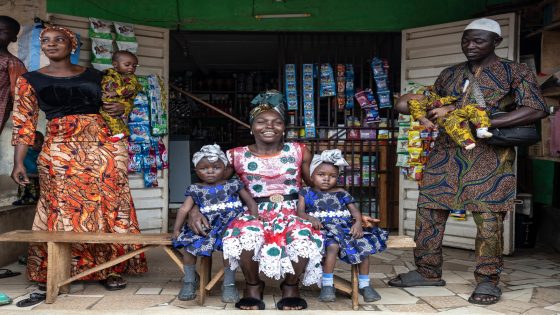On a normal day a visitor might pass Igbo-Ora with little more than a double take, wondering why so many pairs of residents wear matching clothes.
But this weekend left nobody doubting what makes the town in southwest Nigeria special.
With fanfare, pageantry, talent shows and even a royal visit, hundreds of people gathered in the self-proclaimed “twins capital of the world” to celebrate its unusually high rate of multiple births.
“There’s hardly a family here in Igbo-Ora that doesn’t have a twin,” said visiting Yoruba king Oba Kehinde Gbadewole Olugbenle, himself a twin.
Yoruba culture reveres twins and their first names are traditionally fixed – Taiwo meaning “one who tastes the world” for the eldest child, and Kehinde meaning “one who came after” for the second born.
The town stands out even in the wider Yorubaland region, which boasts an above-average incidence of non-identical twins, according to population experts.
The global average birth rate for twins is around 12 per 1,000 births – but in Igbo-Ora, it is thought to be closer to 50 per 1,000, according to scientific studies and hospital records.
Explanations for the abundance differ.
Many residents put it down to diet, especially okra leaf or ilasa soup with yam and amala (cassava flour).
Fertility experts – and several residents – are sceptical, saying there is no proven link between diet and the high twin rate.
Scientists are looking into genetic factors, and how the twins’ special cultural status might make them more likely to find partners and have children.
Whatever the reason, everyone in the town agrees the abundance of twins is a blessing – even more so this year as Nigeria grapples with its worst economic crisis in a generation.
Suliat Mobolaji gave birth to twins eight months ago and said the family had been showered with gifts ever since.
“It’s changed my life,” the 30-year-old said, clutching a son in each arm.
“You can’t give birth to twins and remain down on your luck,” she beamed.
Taiwo Ojewale, a research assistant specialising in Yoruba culture at the University of Ibadan, said celebrating twins was “rooted in traditional religious belief”.
Twins are seen as a gift from the supreme god Olodumare, he explained, and Igbo-Ora’s oral history describes them as a reward following a series of disasters that befell the community.
The town erupted with joy as the event began on Saturday. At the festival ground, staff rolled out a red carpet for scores of twins both young and old.
They paraded in immaculate matching outfits – from glamorous sunglasses and patterned adire fabric to a pair of toddlers sporting purple dresses and identical handbags.
Dozens more twins watched from the stands or milled side by side around town.
The festival’s organisers – themselves twins – say they eventually want to attempt a world record for the largest gathering of twins on the planet.





